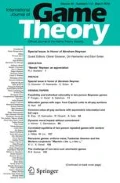Abstract
Under the assumption that wagers remain integer-valued, as would happen in most casinos, we identify the following bizarre situation: there exists a sequence of coin flips \(X\) such that some effective gambler manages to accumulate arbitrary wealth by betting on \(X\), however any such gambler goes bankrupt whenever he tries to take his winnings outside the casino.
Similar content being viewed by others
References
Bienvenu L, Stephan F, Teutsch J (2010) How powerful are integer-valued martingales? Theory of computing systems, Special issue for CiE
Chalcraft A, Dougherty R, Freiling C, Teutsch J (2012) How to build a probability-free casino. Inf Comput 211:160–164
Downey RG, Hirschfeldt DR (2010) Algorithmic randomness and complexity. Theory and applications of computability, Springer, New York
Acknowledgments
The author thanks Leonid Levin for conjecturing the existence of an integer-valued savings paradox.
Author information
Authors and Affiliations
Corresponding author
Rights and permissions
About this article
Cite this article
Teutsch, J. A savings paradox for integer-valued gambling strategies. Int J Game Theory 43, 145–151 (2014). https://doi.org/10.1007/s00182-013-0377-7
Accepted:
Published:
Issue Date:
DOI: https://doi.org/10.1007/s00182-013-0377-7




